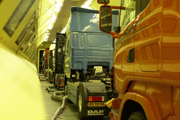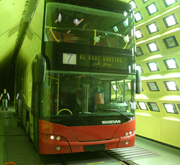To solve individual problems functional tests on subsystems are performed by using customized test procedures. Soiling tests, very important for the transport industry, can be ordered too.
Interior thermal comfort

The tests primarily focus on measuring the time it takes for a vehicle parked over an extended period to heat up or cool down to a specific temperature. Tests are also carried out to investigate the regulation behaviour of the air-conditioning unit under changing ambient conditions from heating to cooling mode through to high-pressure shutdown of the air-conditioning compressor.
The climatic wind tunnel allows the realistic simulation of operating conditions for urban busses, including regular stops. Additionally, dynamometer tests can be carried out to simulate drive cycles or constant loads under simulated conditions of wind speed, solar radiation or heat and moisture emissions from passengers.
Tests with different forms of precipitation

The simulation of rain, wet and dry snow with varying droplet sizes is designed to investigate the ingress of snow and rainwater into air intakes (air-conditioning unit / engine) for different front trim panels, air ducts or separation systems. Rain and snow simulations can also be used to analyse visibility through the windscreen with a focus on the effectiveness of the wiper system and the proper functioning of the rain sensor.
Ambient parameters (temperature/humidity) can be specifically combined to create condensation at the side windows, which strongly impedes the driver’s view to the side mirror.
High humidity levels and freezing ambient temperatures combined with low engine loads may cause ice to form in the ducts of the charge air cooler, thus reducing engine performance. Air temperature and humidity can be adjusted to analyse these special conditions in detail. As the climatic conditions can be exactly reproduced, it is possible to compare different configurations to prevent ice formation.
Proper functioning of engine components

Good cold start behaviour is essential for vehicles parked outside at low temperatures over extended periods of time. Defined ambient conditions can be created to test various engine components, such as the fuel or engine preheating systems. Climatic wind tunnel tests can also be used to analyse the heat development in the engine compartment at extremely hot outside temperatures and high engine loads.
Soiling tests

Good visibility through the side window to the side mirror is a critical requirement for safe driving. Driving on wet pavements usually causes road spray, which inevitably reduces visibility. This type of soiling effect can be made visible by spraying the vehicle front with a fluorescent liquid and illuminating it with a black-light lamp to analyse particle flow. In this way, different vehicle fronts, wind deflectors or mirror shapes can be compared for time-efficient optimisation and further development.
Thermal management

Thermal management denotes the combination of all boundary parameters and interfaces within and to the engine compartment, with special emphasis being placed on drag, air baffles in the engine compartment and so-called underhood flow. This requires the thermal situation with relative wind, load cycles and various power ratings to be simulated as realistically as possible.
Aerodynamics

Fast cars not only require a strong engine but also make high demands on the components used, which must be light, rigid and quiet. The simulation of wind speeds of up to 300 kph offers the manufacturer the opportunity to test and compare different designs of components such as convertible roofs, spoilers or sunroofs.
Tests according to the ATP Agreement
Trailers and containers designed for the transport of perishable foodstuffs must fulfil stringent requirements. These requirements, such as a low heat transfer coefficient or the refrigeration capacity of the refrigeration unit, must be verified in special tests for type approval. Follow-up tests are required for transport vehicles already in operation.
Rail Tec Arsenal is the official testing and certification body for Austria according to the ATP Agreement.
For special requests please contact: